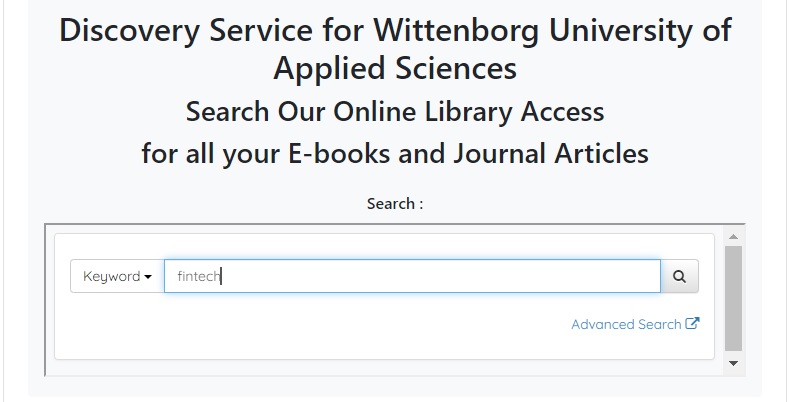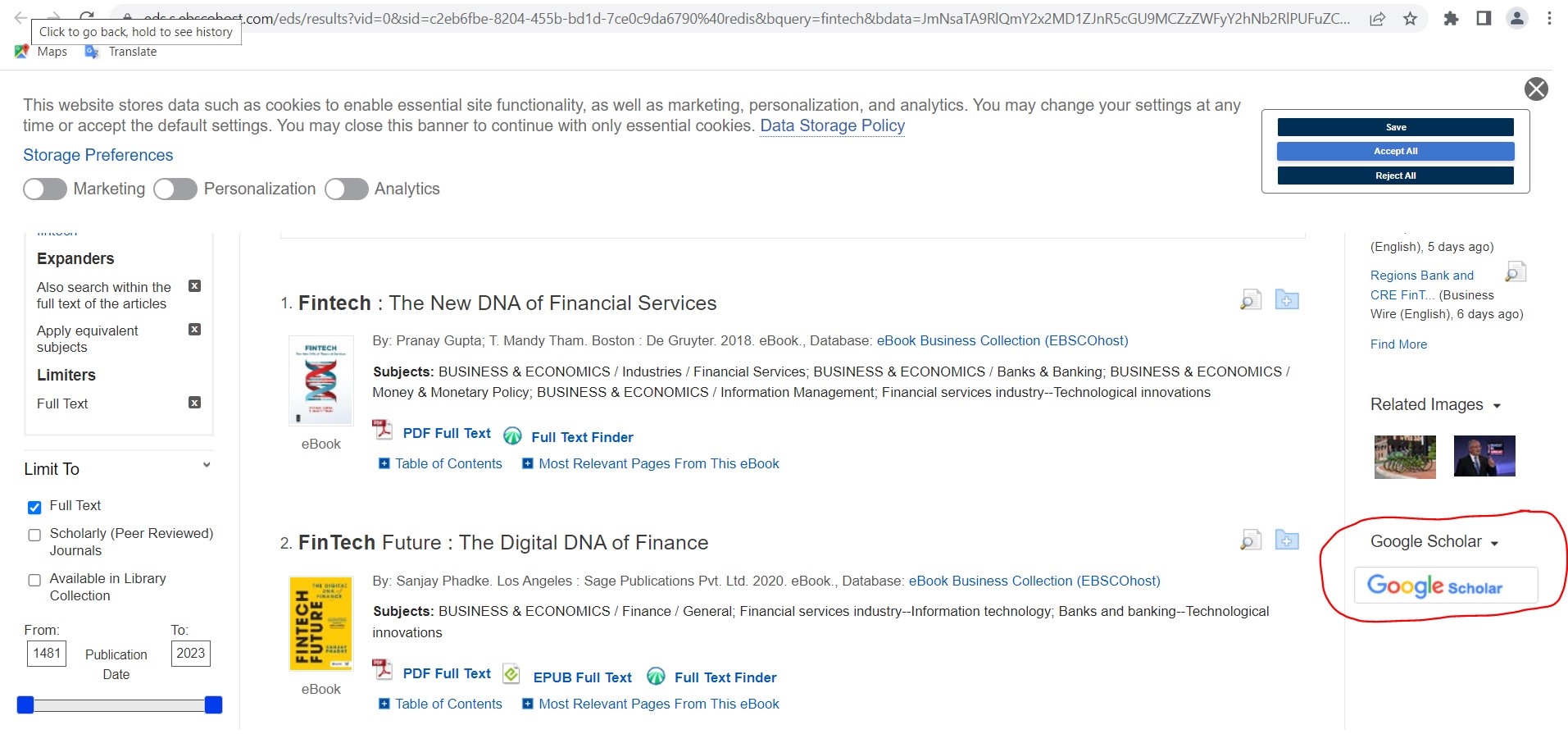Special | A | B | C | D | E | F | G | H | I | J | K | L | M | N | O | P | Q | R | S | T | U | V | W | X | Y | Z |
E |
|---|
Question: (Last edited: Tuesday, 21 February 2023, 3:24 PM)E-Library: How can I access books and journal articles online? | |||
|---|---|---|---|
| Answer: We have partnered with Perlego, EBSCO, Willey, Vital Source, and other publishers to ensure over 1,000,000 different titles of books and over 2,000,000 journal articles are available for our students and teachers. Students and staff can access these resources via the "Online Library Resources" on Wittenborg-Online. A special search function is created in this page to search all journal articles in our database (see Figure 1 below). Moreover, together with our partner, EBSCO we have developed a special widget on EBSCO search engine which will also assist you to find articles on open source publishers such as Google Scholar (see Figure 2 below).. We highly recommend students to use these resources before browsing through other external sources for the same articles or books. Figure 1
Figure 2
| |||
Question: (Last edited: Tuesday, 14 July 2020, 10:03 AM)EEG: What is the EEG and where can I find it? | ||||
|---|---|---|---|---|
| Answer: The Education and Examination Guide (EEG) is the first thing you need to read before you start your classes. The EEG consists of all the crucial information you need for your studies, including handbooks on work placement, graduation assignment, academic writing, etc. EEGs are available for each study programme and can be found in the online Moodle area (https://www.wittenborg-online.com). | ||||
Question: (Last edited: Thursday, 18 June 2020, 8:58 AM)Education Department- How can I contact the education department? | ||||
|---|---|---|---|---|
| Answer: While the Education Department office is open daily for short questions, for consultations
please make an appointment by email to education@wittenborg.eu and you will receive a confirmation within 3 working days. Contacting LecturersAll lecturers can be contacted through their Wittenborg email generally by putting their firstnames.lastname@wittenborg.eu | ||||
Question: (Last edited: Thursday, 10 February 2022, 10:44 AM)Email Receipt: Where will I get the submission receipt? | ||||
|---|---|---|---|---|
| Answer: An email receipt is sent to your S#@student.wittenborg.eu account each time the assignment has been submitted on Turnitin. | ||||
Question: (Last edited: Wednesday, 5 April 2023, 12:41 PM)Emergency Contacts: Where can I find important telephone numbers in case of emergencies? | ||||
|---|---|---|---|---|
| Answer: If you are staying at Wittenborg’s accommodation, the student housing information booklet placed inside your room and in the common area also contains emergency numbers in case of urgent needs. This information can be found in the first page and contains numbers of Wittenborg Housing Department, Police, Fire Brigade and Hospital.
Note: Only call 112 when there is an urgent matter that cannot wait. Calling 112 unnecessarily is a crime in the Netherlands, and you may be fined for wasting the time of the emergency services. The person who answers your call will ask your name, location of the emergency and what kind of emergency is taking place. If they deem it necessary, they will send the relevant emergency services.
In case of non-emergency health problems, you can call the office of the doctor you are registered at. They will tell you what to do from then. If you are not registered with a doctor, make sure to ask the Front Desk to organise that for you at frontdesk@wittenborg.eu. If someone has a major health issue out of office hours or is not registered with a doctor, they can call the Huisartsenpost in Apeldoorn Huisartsenpost in Amsterdam. They will give you instructions on what to do next. Note: Do not go to the emergency room/hospital without calling the Huisartsenpost first. This will not be covered by the insurance and it will take a lot of time before they can help.
Note: You can call the non-emergency Fire Brigade number for things like fallen trees, cats stuck in trees for longer than 48 hours or other non-life threatening occurrences which require the Fire Brigade to visit the scene. In the event of all fires, no matter how small, always call 112.
Note: This number is for people experiencing distressing thoughts of self-harm. For active medical emergencies, always call 112. For help in your own language, you may find resources here and here.
| ||||
Question: (Last edited: Tuesday, 20 October 2020, 4:57 PM)English Competency: How can I improve my English level for my study? | |||
|---|---|---|---|
| Answer: At Wittenborg, we have modules which help you develop your English Language competency. These are as follows: Apart from the above, you can also do your own self-study through relevant reading materials or referring to English/Grammar/Vocabulary online sources. Try the following: ii) Read this News article which gives suggestions on how you can improve your English iii) Visit the website BBC: Go the Distance: Academic Writing iv) Visit the website Harvard College Writing Centre: Strategies for Essay Writing If you need further help, contact your English teacher or your process tutor/study advisor. | |||
Question: (Last edited: Thursday, 18 June 2020, 9:03 AM)Enrolled Programmes: How can I see the details of enrolled programmes on my results page? | ||||
|---|---|---|---|---|
| Answer: This can be done by clicking the 'Personal details' option on the http://myresults.wittenborg.eu. The 'Personal details' option shows only your active programmes. | ||||
Question: (Last edited: Monday, 13 July 2020, 11:54 AM)Enrolment in Modules: How should I know which modules to enrol in? | ||||
|---|---|---|---|---|
| Answer: In order to know what modules you have to attend in each block please check your study programme curriculum. This can be found in your programme's Education and Examination Guide (EEG) online (Part 3) | ||||
Question: (Last edited: Tuesday, 16 December 2025, 9:45 AM)Exam Proctoring via SMWOL | |||
|---|---|---|---|
| Answer: Clear Guidance for SMWOL Exam Proctoring for Students , | |||
Question: (Last edited: Tuesday, 14 July 2020, 9:33 AM)Exam Results: I cannot see my exam results. | ||||
|---|---|---|---|---|
| Answer: If you
cannot find an exam result or grade, please contact Exam Results via this
email: examresults@wittenborg.eu or contact your process tutor
for further assistance. | ||||
Question: (Last edited: Tuesday, 28 April 2020, 1:24 PM)Exam Results: Where can I view my exam marks or results? | ||||
|---|---|---|---|---|
| Answer: The exam results can be found in http://myresults.wittenborg.eu. Students can click on the 'Study Progress Review' by clicking on the 'Progress' tab. Steps
Note: If results are missing on MyResults, please send an email to examresults@wittenborg.eu | ||||
Question: (Last edited: Wednesday, 29 October 2025, 8:24 AM)Exam Review: How is exam review conducted for Type 1 WRITTEN exams? | |||
|---|---|---|---|
| Answer: As described in the General Assessment Policy, in Part 5 of the EEG, students will be given an opportunity to review their made exams and they can discuss the grading with the exam review organizer. Any questions or doubts about the marking criteria can be raised during this session and registered for further review or appeal that will be forwarded to the respective teacher. No extended opportunities are organised outside these sessions scheduled during the project week, under general circumstances. Exam Reviews are organised during Project Weeks and students are advised to check the timetable for specific information such as the exact date, time and location. Kindly note the Exam Review Rules below. Exam Review Instructions
Some useful tips:
Note (!) Violation of the rules can lead to serious consequences as per the Examination rules stated in the EEG. Such cases will be referred to the Graduation & Examination board for the decision. | |||
Question: (Last edited: Wednesday, 13 April 2022, 8:13 AM)Exam Review: How is exam review conducted for Type 1/Type 2 ONLINE assignments? | |||
|---|---|---|---|
| Answer: All students should be given the opportunity to review their marked exam papers. As a standard quality control procedure, a moderation process is conducted by the exam committee prior to the results released to students for consistency in grading. And if inefficiencies of grading are found, corrective measures will be taken. This process is put in place to ensure that the students are not disadvantaged. Note: Students can only send appeal request within 1 week after receiving the results. | |||
Question: (Last edited: Wednesday, 1 October 2025, 9:39 AM)Exam Timetable: How can I access the examination timetable? | |||
|---|---|---|---|
| Answer: You need to login in the timetable, select your programme. Now, you can find your examination dates. https://timetable.wittenborg.eu is the webpage that has all scheduled classes & exams for all programmes. You need to access it to find information on the scheduled class & exam location, date and time and lecturer details. | |||
Question: (Last edited: Friday, 26 August 2022, 9:03 PM)Exam Type 1: How will Exam Type 1 be conducted? | ||||
|---|---|---|---|---|
| Answer: All modules with Type 1 examinations will be 'Written Examinations under Invigilation'. This means that students have to be present physically in the classroom on the stipulated day and time to take the examination. Students can check their time-table for the actual date, time and venue of the examination. More details about Type 1 or Type 2 examinations can be obtained from the EEG Part 5: General Assessment Policy. | ||||


